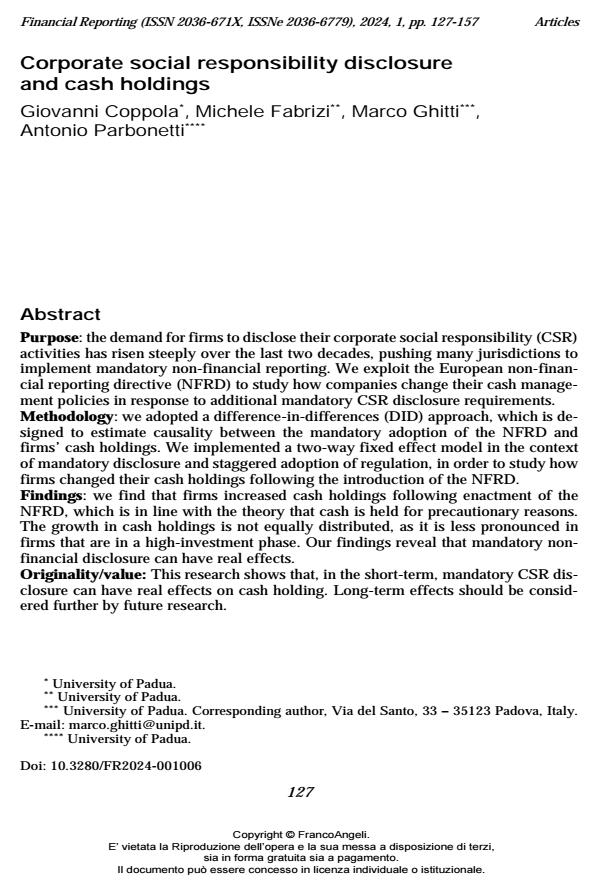Corporate social responsibility disclosure and cash holdings
Journal title FINANCIAL REPORTING
Author/s Giovanni Coppola, Michele Fabrizi, Marco Ghitti
Publishing Year 2024 Issue 2024/1
Language English Pages 31 P. 127-157 File size 249 KB
DOI 10.3280/FR2024-001006
DOI is like a bar code for intellectual property: to have more infomation
click here
Below, you can see the article first page
If you want to buy this article in PDF format, you can do it, following the instructions to buy download credits

FrancoAngeli is member of Publishers International Linking Association, Inc (PILA), a not-for-profit association which run the CrossRef service enabling links to and from online scholarly content.
Purpose: the demand for firms to disclose their corporate social responsibility (CSR) activities has risen steeply over the last two decades, pushing many jurisdic-tions to implement mandatory non-financial reporting. We exploit the European non-financial reporting directive (NFRD) to study how companies change their cash management policies in response to additional mandatory CSR disclosure requirements. Methodology: we adopted a difference-in-differences (DID) approach, which is designed to estimate causality between the mandatory adoption of the NFRD and firms’ cash holdings. We implemented a two-way fixed effect model in the context of mandatory disclosure and staggered adoption of regulation, in order to study how firms changed their cash holdings following the introduction of the NFRD. Findings: we find that firms increased cash holdings following enactment of the NFRD, which is in line with the theory that cash is held for precautionary reasons. The growth in cash holdings is not equally distributed, as it is less pronounced in firms that are in a high-investment phase. Our findings reveal that mandatory non-financial disclosure can have real effects. Originality/value: This research shows that, in the short-term, mandatory CSR disclosure can have real effects on cash holding. Long-term effects should be con-sidered further by future research. Practical implications (optional): Policymakers should consider that additional CSR requirements are costly to firms, and thus find mechanisms that induce firms to adopt these requirements despite their costs
Keywords: corporate social responsibility, non-financial disclosure, mandatory disclosure, cash holdings, real effects
Jel codes: G38, K22, M14, M41, M48
- Environmental reporting and religiosity: An empirical analysis within the European financial sector Simone Terzani, Teresa Turzo, Gianluca Moretti, in FINANCIAL REPORTING 1/2025 pp.117
DOI: 10.3280/fr202516716
Giovanni Coppola, Michele Fabrizi, Marco Ghitti, Corporate social responsibility disclosure and cash holdings in "FINANCIAL REPORTING" 1/2024, pp 127-157, DOI: 10.3280/FR2024-001006